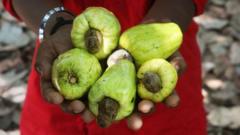Ghana, the world's third-largest exporter of raw cashew nuts, is wrestling with low domestic processing rates and global pricing disparities that leave local farmers struggling. Efforts to boost the industry are hampered by high-interest loans, inadequate infrastructure, and the need for better marketing strategies. Entrepreneurs like Mildred Akotia are leading the charge for local processing, but substantial challenges remain.
Ghana's Cashew Industry Faces Challenges Amidst Global Demand

Ghana's Cashew Industry Faces Challenges Amidst Global Demand
As Ghana strives to elevate its cashew market, local farmers and entrepreneurs confront systemic hurdles in processing and pricing that hinder growth.
Ghana, known for its raw cashew nut exports, is grappling with the complexities of enhancing its local cashew processing industry. As I stood near a bustling street vendor in Accra, I was struck by the high price of roasted cashews—significantly marked up from what farmers receive for the raw product. The stark contrast highlights the struggles faced by local producers in a market dominated by external factors.
Ghana ranks as the world's third-largest exporter of unprocessed cashews, trailing behind the Ivory Coast and Cambodia. Approximately 300,000 Ghanaians depend on cashew farming for their livelihoods, yet the challenges of unreliable supply chains and fluctuating market prices persist. Local farmer Nashiru Seydou emphasizes these difficulties, pleading for governmental assistance to create more sustainable jobs and enhance his income from cashew farming.
The current financial landscape favors foreign processors, who pay a premium for unshelled nuts before rebranding and reselling them at astronomically higher prices. Bright Simons, an economic analyst, revealed alarming statistics indicating that roasters can buy raw cashews for about $500 per tonne but sell processed nuts for between $20,000 and $40,000 per tonne.
Despite producing around 180,000 tonnes of cashews annually, with over 80% exported, Ghana misses out on the advantages of local processing. Mildred Akotia, CEO of Akwaaba Fine Foods, is among the few attempting to address this imbalance. Although she admits to the challenges of obtaining proper machinery and navigating high-interest loan systems in Ghana, she remains committed to increasing local cashew processing.
Previously, the Ghanaian government attempted to ban raw cashew exports in 2016 to stimulate domestic processing, a strategy ultimately abandoned due to backlash from farmers reliant on those sales. Current discussions about imposing tariffs or direct bans on raw exports could further complicate matters, according to industry analysts, who argue that building a robust local market for cashews is crucial.
Noted economist Prof. Daron Acemoglu agrees, advocating for improvements in transportation networks and access to international markets while urging local producers to focus on effective branding and marketing strategies. He points to the “brain drain,” where talented entrepreneurs leave Ghana for more favorable conditions abroad, as a significant factor inhibiting local business growth.
Amidst these challenges, Akotia is determined to enhance her business, hoping to create a streamlined logistics operation for her cashew processing needs. With demand spiking both locally and internationally, she envisions transforming the landscape of Ghanaian processed foods into a thriving market, contributing to the nation's economic future.




















